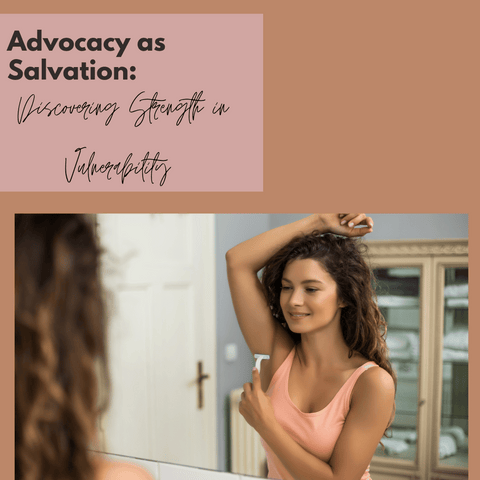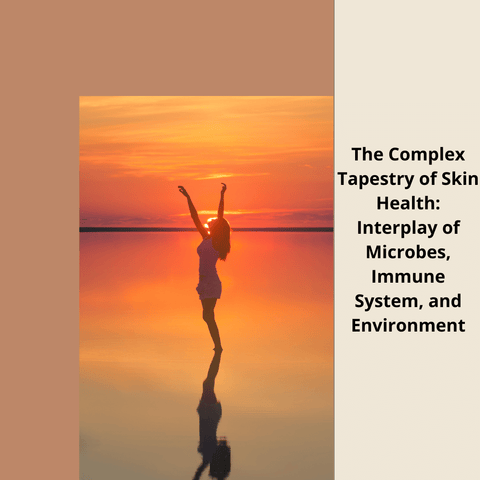"Hidradenitis Suppurativa: An Empowering Odyssey" is a powerful and uplifting trip that many people who suffer from this chronic skin condition may go on. Hidradenitis Suppurativa (HS) is a painful and sometimes misunderstood ailment that can have a negative influence on a person's quality of life. This article will look at how to navigate life with HS, giving people the tools they need to manage their illness and find assistance along the way. Remember that while living with Hidradenitis Suppurativa can be difficult, with the correct support and methods, you can live a full and empowered life. Don't be afraid to seek the assistance of healthcare professionals, support networks, and educational resources while you navigate this voyage.
Grappling with HS: A Glimpse into a Life-Long Journey

This chronic skin condition can be physically and emotionally draining, necessitating perseverance and adaptive methods to successfully manage life. Early diagnosis and knowledge, symptom management, flare-ups and remissions, emotional toll, treatment options, lifestyle adaptations, advocacy and awareness, support systems, quality of life, and hope and resilience are just a few of the major parts of this life-long journey. While the route is not without difficulties, it demonstrates the human spirit's ability to adapt, learn, and grow in the face of adversity
Initial Encounters: Symptoms, Misdiagnosis, and Reality
These early encounters can be perplexing and distressing, and they eventually influence the course of one's HS career. Here is a closer look at these critical elements:
#1 Symptoms and Recognition:
-
The journey frequently begins with the appearance of painful and recurring boils, abscesses, and lumps in sweat glands and hair follicle locations such as the armpits, groin, buttocks, and under the breasts.
-
These symptoms, along with redness, inflammation, and severe pain, may prompt people to seek medical attention.
#2 Misdiagnosis and Delayed Diagnosis:
-
Misdiagnosis is a common and aggravating aspect of the HS experience. Many healthcare professionals may initially misdiagnose HS as boils, cysts, or folliculitis.
-
This misdiagnosis can cause delays in receiving proper treatment, leaving people in pain and discomfort.
#3 Physical and Emotional Toll:
-
Physical signs of HS, such as open sores, tunnels beneath the skin, and scars, can have a substantial influence on one's self-esteem and body image.
-
The emotional toll of living with undiagnosed or misdiagnosed HS can lead to feelings of isolation, frustration, and despair.
#4 Seeking Specialists:
-
As symptoms worsen and people go undiagnosed or misdiagnosed, they often seek out specialists who are more familiar with HS, such as dermatologists consultation.
-
Consultation with these specialists can finally result in an accurate diagnosis and the start of appropriate treatment.
#5 Treatment Initiation:
-
Following a proper diagnosis, individuals may begin a treatment regimen that may include antibiotics, anti-inflammatory medications, lifestyle changes, or surgical interventions.
-
The early stages of treatment can be difficult as people adjust to new routines and medications.
#6 Support Systems and Coping:
- During these first encounters, it is critical to establish a support network of friends, family, or support groups. Connecting with others who have gone through similar experiences can provide emotional support as well as valuable insights.
#7 Advocacy and Awareness:
-
Some people become advocates for HS awareness, sharing their personal experiences in order to educate others and reduce the stigma associated with the condition.
-
Raising awareness can also aid in improving healthcare professionals' understanding of HS, potentially leading to earlier and more accurate diagnoses.
#8 Hope and Resilience:
-
Despite the difficulties of the early stages of HS, many people find hope and resilience in knowing they are not alone and that treatment options are available.
-
The journey may be difficult, but with determination and support, individuals can learn to manage their HS and improve their quality of life.
The Skin's Microbial Symphony: Understanding Flare-ups and Inflammation
This theory sheds light on the underlying mechanics of HS and how microbial imbalances might cause or worsen symptoms. Here's a more in-depth look at the subject, such as the skin microbiome, microbial imbalances, inflammation triggers, the role of bacterial biofilms, understanding flare-ups, treatment strategies, lifestyle factors, and personalised care. By addressing microbial imbalances and inflammation, healthcare providers can develop more effective strategies to manage and alleviate the symptoms of Hidradenitis Suppurativa.
Navigating Emotions: The Psychological Toll and the Path to Acceptance
The Psychological Toll and the Path to Acceptance dives into the tremendous emotional obstacles that people living with Hidradenitis Suppurativa (HS) encounter, as well as the route to embracing and coping with this chronic sickness. Here's a closer look at this critical point:
#1 Emotional Toll of HS:
-
Living with HS can have a severe emotional impact. Chronic pain, repeated flare-ups, and physical appearance changes can cause feelings of frustration, despair, and even depression.
-
The unpredictable nature of HS can induce anxiety and tension because people never know when the next painful flare-up will occur.
#2 Self-Esteem and Body Image:
-
HS can have a profound impact on self-esteem and body image. Scarring, abscesses, and open sores can all cause feelings of embarrassment and shame.
-
Coping with these emotional issues may require time and support from loved ones as well as mental health professionals.
#3 Isolation and Loneliness:
-
Individuals suffering from HS may feel isolated because the condition is poorly understood by the general public. They may withdraw from social activities as a result of pain or embarrassment.
-
Seeking support groups or online communities can help alleviate feelings of loneliness and give you a sense of belonging.
#4 Coping Mechanisms:
-
Developing effective coping mechanisms is crucial. This may include mindfulness practises, relaxation techniques, and stress management strategies to help you navigate the emotional ups and downs of living with HS.
-
Some people express their emotions through creative outlets such as writing, art, or music.
#5 Professional Support:
-
Seeking the advice of mental health professionals, such as therapists or counsellors, can be extremely beneficial in coping with the psychological effects of HS.
-
These professionals can offer tools and strategies for dealing with anxiety, depression, and other emotional difficulties.
#6 Acceptance and Self-Love:
-
Acceptance of one's condition is an important step. It entails accepting that HS is a natural part of life but does not define one's worth or identity.
-
Self-acceptance and self-love are critical components of this journey, allowing individuals to embrace their bodies while focusing on their inner qualities.
#7 Educating Others:
-
Educating friends, family, and coworkers about HS can foster understanding and reduce stigma. This can result in a more supportive environment where people feel comfortable discussing their condition.
#8 Advocacy and Awareness:
-
Some people choose to become HS advocates, raising awareness about the disease and advocating for better research, treatment options, and support.
-
Advocacy efforts that promote greater understanding and empathy can help reduce the psychological toll of HS.
#9 Finding Joy and Fulfillment:
-
Despite the difficulties, people with HS can find joy and fulfilment in a variety of areas of their lives, including relationships, hobbies, and personal accomplishments.
-
Concentrating on the positive aspects of life can improve overall well-being and emotional resilience.
Advocacy as Salvation: Discovering Strength in Vulnerability

Discovering Strength in Vulnerability looks at how people with Hidradenitis Suppurativa (HS) can use their own experiences to become a strong force for change and healing. For those managing the obstacles of HS, advocacy may be a source of empowerment, community-building, and optimism. Here's a more in-depth look at the subject:
#1 Personal Journey to Advocacy:
-
Advocacy is frequently the result of a personal journey. Individuals living with HS may opt to utilise their experiences to raise awareness and support others after dealing with the physical and emotional toll of the condition.
-
Sharing one's HS experience and problems can be cathartic and beneficial to those who may be feeling alienated or misunderstood.
#2 Raising Awareness:
-
Raising awareness about HS is the first step in advocacy. Many people, even healthcare experts, may be unfamiliar with the illness. Advocates can educate others about HS symptoms, diagnosis difficulties, and treatment options.
-
Social media initiatives, public speaking engagements, and collaboration with healthcare organisations are all examples of awareness campaigns.
#3 Reducing Stigma:
-
Advocates often work to reduce the stigma associated with HS. The visible symptoms of the condition, combined with its misunderstood nature, can lead to feelings of shame and isolation.
-
By sharing personal stories and dispelling misconceptions, advocates can foster empathy and understanding.
#4 Support Networks:
-
Advocacy can result in the establishment of support networks. Advocates connect with others who have had similar experiences, giving them a sense of belonging and validation.
-
These networks are built in large part through the use of social media, online forums, and support groups.
#4 Empowering Others:
-
Advocacy strengthens not only the advocates but also those who listen to their tales. It motivates people with HS to seek help, interact with their healthcare providers, and become their own advocates.
-
A key component of advocacy is motivating others to take charge of their health and well-being.
#5 Legislative and Research Advocacy:
-
Some activists prioritise legislation and scientific research. They advocate for policies that help people with HS, as well as for funding for HS research and better treatment choices.
-
Advocates may collaborate with research institutions, medical professionals, and government agencies to effect change.
#6 Personal Healing:
-
Advocacy can be a source of personal healing. It enables people to channel their pain and struggles into a positive force for change.
-
Helping others provides advocates with a renewed sense of purpose and hope, which can benefit their emotional well-being.
#7 Inspiring Resilience:
-
Advocacy stories serve as powerful examples of overcoming adversity. They demonstrate that even in the midst of chronic illness, people can find strength, meaning, and hope.
-
Advocates motivate others to persevere and believe in their ability to overcome obstacles.
Building Connections: The Power of the HS Community
The Power of the HS Community explores the invaluable role that a supportive community plays in the lives of individuals grappling with Hidradenitis Suppurativa (HS). This community provides understanding, empathy, and a sense of belonging, helping those with HS navigate their journey more effectively. Here's a closer look at the significance of the HS community:
-
Shared Experiences: The HS community brings together people who have gone through similar experiences and hardships. These common experiences foster a sense of community and understanding that is difficult to discover elsewhere.
-
Reducing Isolation: Living with HS can be isolating because of the pain, shame, and lack of understanding of the disorder. Individuals who may feel alone in their troubles can find solace in the HS community. Individuals can connect with people who "get it" through internet forums, support groups, and social media platforms, offering a sense of belonging.
-
Empathy and Validation: Individuals in the HS community can openly express their symptoms, disappointments, and emotional issues without fear of judgement. This affirmation of their experiences can be really beneficial.
-
Practical Advice and Tips: Individuals with HS frequently give practical advice and techniques for managing their disease. These insights can include wound care recommendations, coping tactics during flare-ups, and treatment alternatives.
-
Advocacy and Awareness: The HS community is critical to lobbying and awareness activities. Its members work together to promote awareness about HS, clarify myths, and push for better research and healthcare resources. Social media campaigns, awareness events, and collaborations with healthcare organisations are examples of advocacy initiatives.
-
Mental Health Support: Many people in the HS community are aware of the emotional toll that the illness may have. They provide assistance in dealing with anxiety, depression, and other mental health issues. Sharing coping skills and encouraging mental health are essential components of the community's support system.
-
Resource Sharing: Members of the HS community frequently exchange resources including reliable healthcare providers, treatment choices, and the most recent study findings. Individuals can use these tools to make educated decisions regarding their care and treatment plans.
-
Peer Inspiration: Seeing others in the HS community survive, thrive, and find joy in their life in the face of adversity may be a significant source of inspiration for those coping with HS. Stories of perseverance and success provide inspiration and motivation.
-
Safe Space for Expression: People can express their ideas, concerns, and accomplishments in a safe setting provided by the HS community. This can be therapeutic and assist folks in processing their feelings.
-
Community Events and Gatherings: Some HS members organise local or virtual events, seminars, or gatherings. These gatherings provide opportunities for face-to-face interaction and learning.
Empowerment through Education: Raising Awareness and Knowledge
Raising Awareness and Knowledge emphasises the vital role that education and awareness campaigns play in aiding persons living with Hidradenitis Suppurativa (HS) and their communities. By increasing understanding and information about HS, these activities empower individuals to seek timely diagnosis, acquire appropriate care, and inspire empathy and support. Here's an in-depth examination of the impact of education and awareness in the context of HS:
-
Early Diagnosis and Treatment: Early diagnosis and intervention require education of the general population and healthcare professionals about the signs and symptoms of HS. Increased knowledge can result in faster referrals to dermatologists or specialists, allowing people to obtain treatment sooner and perhaps minimising disease progression and complications.
-
Reducing Misconceptions and Stigma: Many myths surround HS, including the assumption that it is a hygiene problem. Education efforts can assist in dispelling these misunderstandings and lowering the stigma connected with the disease. Reduced stigma encourages people with HS to seek care and support without fear of being judged.
-
Promoting Self-Advocacy: Knowledge gives you power. Individuals with HS who are educated about their illness, treatment options, and self-care practices become active advocates for their health. Patients who are well-informed can have meaningful conversations with healthcare providers and make decisions that are in line with their goals and preferences.
-
Supporting Mental Health: Education about the emotional toll of HS is crucial. Awareness campaigns can highlight the psychological challenges individuals may face, such as depression, anxiety, and self-esteem issues. By addressing the mental health aspects of HS, education initiatives promote holistic well-being.
-
Empowering Care givers and Loved Ones: Raising HS awareness also includes carers, family members, and friends. Support networks that are well-informed can provide more effective emotional and practical assistance. Knowledge assists loved ones in comprehending the condition's influence on the individual's life and creates empathy.
-
Community Building: Education and awareness campaigns frequently result in the establishment of supporting communities. Individuals with HS and their loved ones can connect with others who understand what they are going through. These communities serve as a forum for people to share knowledge, offer encouragement, and advocate for change.
-
Advocacy for Research and Resources: Public awareness campaigns can influence increased funding and resources for HS research. As a result, improved therapy options and a better understanding of the illness may be available. Another beneficial effect of education and awareness campaigns is advocacy for enhanced healthcare resources such as specialised clinics and support services.
-
Collaboration with Healthcare Professionals: Individuals with HS, advocacy groups, and healthcare professionals can all benefit from education programmes. They can work together to improve the quality of care and support offered to people with HS.
-
Public Engagement and Policy Change: Increased awareness can lead to increased public participation and support for policy reforms that benefit people with HS. This may include treatment insurance, employment adjustments, and enhanced access to healthcare.
-
Inspiring Empathy and Solidarity: Finally, education and awareness foster empathy and social solidarity. Understanding the difficulties that people with HS endure develops a sense of community and support.
Channeling Experiences: Giving Voice to the Voiceless
Giving Voice to the Voiceless emphasises the significance of sharing the experiences of people living with Hidradenitis Suppurativa (HS) in order to foster understanding, empathy, and support in society. This process of giving voice to the voiceless not only affirms people with HS's problems, but also generates advocacy, awareness, and change. Here's a more in-depth look at the effects of sharing these experiences:
-
Raising Awareness: Personal stories serve as powerful tools for raising awareness about HS. Sharing experiences through social media, blogs, interviews, and documentaries can educate the public about the condition. Awareness initiatives often lead to an increased understanding of HS symptoms, challenges, and the need for early diagnosis and intervention.
-
Reducing Stigma and Misconceptions: Personal accounts aid in the dispelling of myths and the reduction of the stigma associated with HS. They emphasise that HS is a valid medical illness, not the result of inadequate hygiene. Individuals with HS challenge conventional beliefs and develop empathy by putting a human face to the condition.
-
Empowering Others: Individuals with HS who share their experiences become champions for themselves and their communities. They inspire people to seek aid, voice their needs, and engage in self-advocacy by speaking out. Sharing can be therapeutic and restorative, allowing people to process their own journey and gain ownership over their narrative.
-
Connecting with a Community: Personal stories foster bonds throughout the HS community. When people recognise themselves in the experiences of others, they feel less alone and more understood. Online forums, support groups, and social media platforms all provide places for people to share and connect.
-
Supporting Mental Health: Personal accounts frequently discuss the emotional toll of having HS, such as anxiety, despair, and body image difficulties. Sharing these experiences can help others get mental health care and resources. It can also promote open dialogue on the intersection of physical and mental health.
-
Advocacy and Policy Change: Personal tales have the potential to impact legislation. Advocates can use their experiences to lobby legislators for better healthcare services, research funding, and workplace adjustments. They can also motivate change within healthcare systems to improve care for people with HS.
-
Inspiring Resilience and Hope: Personal stories of achievement and resilience offer hope to those experiencing similar struggles. They show that it is possible to have a fulfilling life despite the challenges of HS. These stories illustrate the significance of perseverance and determination in the face of hardship.
-
Educating Healthcare Professionals: Sharing stories can help educate healthcare professionals, like dermatologists and primary care physicians, on the complexity of HS. This can lead to more precise diagnosis and more effective treatment approaches.
-
Artistic Expression: Some people reflect on their high school experiences through art, poetry, writing, or other kinds of creative expression. This not only allows for self-expression, but also promotes awareness in an unusual and effective way.
From Pain to Purpose: Transformative Moments in the HS Odyssey

Transformative Moments in the HS Odyssey delves into the transformative moments in the lives of those living with Hidradenitis Suppurativa (HS) that turn their anguish and hardships into a feeling of purpose and perseverance. These moments of empowerment and progress frequently define the HS experience. Here's a closer look at these watershed moments:
-
The Moment of Diagnosis: Receiving an HS diagnosis, while initially intimidating, can be a watershed moment. It gives people clarity regarding their disease and a starting point for managing it.
-
Connecting with the HS Community: Finding a supportive group of people who understand the difficulties of having HS can be life-changing. It promotes a sense of belonging, empathy, and the realisation that you are not alone on your journey.
-
The First Step Towards Self-Advocacy: Learning to advocate for your own needs and interact with healthcare experts is a watershed event. It gives people the ability to make their own health-care and treatment decisions.
-
Discovering Effective Treatment: Finding a treatment plan that brings relief from pain and reduces the frequency of flare-ups can be life-changing. It restores a sense of control and hope.
-
Educating Others About HS: The decision to educate friends, family, and even strangers about HS is a watershed moment. It raises awareness, dispels myths, and decreases stigma, helping the entire HS community in the long run.
-
Supporting Mental Health: Seeking help for mental health issues such as anxiety or depression is an important step towards self-care. It recognises the emotional impact of HS and encourages general well-being.
-
Advocating for Research and Resources: Individuals and the HS community as a whole can benefit from advocacy activities to acquire money for HS research, boost awareness, and improve healthcare resources. It propels both progress and change.
-
Turning Pain into Purpose: Many people with HS find meaning in advocating for others, raising awareness, and sharing their personal stories. These initiatives transform their own pain into a force for change.
-
Achieving Personal Milestones: Personal achievements, whether in job, education, or personal life, show that people with HS may live full lives despite their condition. These landmarks serve as sources of strength and inspiration.
-
Inspiring Others: Knowing that their story and journey inspire others with HS to persevere, seek help, and live with hope is a life-changing experience for many people.
-
Finding Moments of Joy and Gratitude: Despite the difficulties, people with HS frequently enjoy moments of joy and thankfulness. These tiny or important occurrences remind people of the beauty of life and the value of resilience.
-
Becoming Mentors and Advocates: As people gain knowledge and empowerment, they frequently become mentors and advocates for others with HS. This mentorship job can be life-changing for both the mentor and those they help.
Treatment Landscapes: The Evolving Nature of Managing HS
The Evolving Nature of HS Management investigates the dynamic and evolving approaches to HS management. The understanding of HS and the available treatment choices have progressed throughout time, providing hope and an improved quality of life for people living with this chronic skin illness. Traditional therapies, biologic therapies, surgical interventions, emerging therapies, lifestyle and dietary modifications, holistic approaches, patient-centered care, multidisciplinary care teams, advocacy for research and resources, and hope and awareness are all part of the changing treatment landscape for HS. While obstacles remain, increasing treatment choices and integrative methods offer hope and better prospects for people living with HS.
The Complex Tapestry of Skin Health: Interplay of Microbes, Immune System, and Environment

This interaction includes the skin's microbiota, the immune system, and environmental elements, all of which are necessary for skin health. Here's a thorough examination of these interrelated elements:
-
The Skin Microbiome: A rich ecology of microorganisms, including bacteria, fungus, and viruses, lives on the skin. The skin microbiome refers to this collective community. A healthy skin microbiome is essential for protecting it from pathogens and preserving its health.
-
Microbial Diversity: A varied array of microorganisms on the skin aids in the maintenance of a balanced microbiome. Various species contribute to different areas of skin health and function. Microbial diversity imbalances can cause skin problems such as infections or disorders such as acne and eczema.
-
The Immune System's Role: The immune system is critical to skin health. It recognises and responds to pathogen threats while being tolerable to helpful microorganisms. Immune system dysregulation can result in skin diseases such as psoriasis, in which immune cells mistakenly assault healthy skin cells.
-
Immune-Microbiome Interaction: The skin microbiota and the immune system have intricate interactions. Beneficial microbes can activate the immune system to protect against infections, while the immune system aids in microbial balance maintenance. Imbalances might result in inflammatory reactions or skin problems.
-
Skin Barrier Function: The stratum corneum, the skin's outermost layer, works as a barrier, preventing moisture loss and hazardous substances from entering. A healthy skin microbiota and a well-functioning immune system are essential for preserving the barrier's integrity.
-
Environmental Factors: Environmental elements such as UV radiation, pollution, temperature, and humidity can all have an effect on skin health. UV radiation, for example, can harm skin cells and increase the risk of skin cancer, whilst pollution can hasten ageing and skin problems.
-
Lifestyle and Hygiene Practices: Personal habits such as skincare routines, nutrition, and hygiene practises can all have an impact on the microbiome and overall health of the skin. Maintaining a healthy skin barrier requires good hygiene practices such as regular washing and moisturising.
-
Skin Conditions and Diseases: Disruptions in the interaction of microorganisms, the immune system, and the environment can result in a variety of skin problems and diseases, ranging from common issues like acne and dermatitis to more serious conditions like psoriasis and skin cancer.
-
Holistic Approaches to Skin Health: The interdependence of these elements is taken into account in holistic approaches to skin health. They emphasise healthy eating, stress management, and a well-rounded skincare regimen.
-
Research and Advancements: Ongoing research into the skin microbiota, immunology, and environmental variables is yielding new insights and novel treatments for preserving and restoring skin health.
Looking Ahead: Hope, Research, and the Promise of Tomorrow
This perspective takes into account continuing research, advances in treatment choices, and the joint efforts of individuals, healthcare professionals, and advocacy groups to enhance the lives of those afflicted by HS. Here's a closer look at the promise of tomorrow in the context of HS, such as treatment advances, clinical trials, personalised medicine, increased awareness, supportive communities, mental health integration, education and training, resource advocacy, lifestyle and holistic approaches, hope and resilience, research breakthroughs, collaboration, and partnerships. There is true hope for a happier and more optimistic future for people living with HS thanks to continuous research, more awareness, improved therapies, and a supportive community.
The Continued Call to Action: Being a Lifelong HS Advocate

Being a lifelong advocate for HS entails making consistent efforts to improve the lives of those affected by the illness and effect positive change. Raising awareness, building support networks, advocating for resources, participating in research and clinical trials, mentoring and providing support, collaborating with healthcare professionals, promoting mental health awareness, staying informed, inspiring change, sustaining hope and resilience, fostering a culture of advocacy, and never giving up are just a few of the responsibilities of a lifelong HS advocate. Lifelong advocates shape a brighter future for people with HS through ongoing awareness, support, research, and collaboration.
















